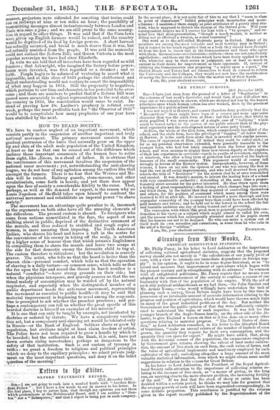THE PUBLIC SCHOOLS.
28th December 1853.
Sut—I have just risen from the perusal of a letter of "Sagittarius" hi the columns of last week's Spectator, and would fain, if you will allow me, urge one or two remarks in answer, which arc dictated not less by the known principles upon which human action has ever worked, than by the practical experience of a public school life.
1 was not myself at Harrow, and cannot therefore deny positively that the " Decemvirate " there might have been of a severer and more oppressive character than was the sixth form at Eton ; but this I know, that whilst in statu pupillari I was never aware of a single case of " bullying " which could be traced rather to the suatesn of our public schools than to the phy- sical superiority and the evil-disposed nature of some petty tyrant. At Eton, the whole of the filth form, which comprehends one-third of the school, and the sixth form, have the privilege of " fagging" all below them : at Harrow, it is the sixth form alone that is invested with similar powers. The cases of oppression at Eton, (if indeed they could be called such,) as far as my personal observation extended, were generally traceable to the younger boys, who had but lately emerged from the lower parts of the school, and were anxious to display their new-blown dignity at the expense of their late copartners in servitude—rarely to youths of seventeen, eighteen, or nineteen, who after a long term of probation had arrived at the highest honours of the small community. This argument would of course tell strongly in favour of the harrow system. Independently, however, of these reasons, I have on my side the opinion of one who was among the first to lead the van in all social improvements, and who well deserved from public schools the title of "Restitutor" for the system that he at once remodelled and created. It was Arnold's maxim, to intrust the leading boys of a school with very considerable authority; demanding at the same tame a propor- tionately strict account for the power intrusted. He thus threw upon thorn a feeling of great reeponsibility—that feeling which changes boys into men ; and fitted them, by the habits that they acquired of controlling themselves and others, for the position of command which many among them were destined to fill in after life. He insured to himself a more thorough and less unpopular censorship of theyounger boys than could have been effected by paid masters and tutors; and he held out to the lowest in the school the fair and laudable ambition one day of being trusted and of governing. The veneration with:Which this great man is generally regarded adds con- firmation to his views on a subject which might almost be called his own, and the success which has subsequently attended most of his pupils shows that his lessons are not to be despised. He who can make a system out of itself work its own remedies and corrections, is wiser than he who calls in the aid of a foreign " orbilius."


































 Previous page
Previous page